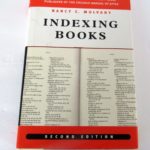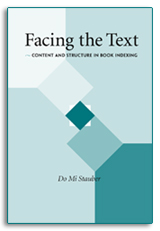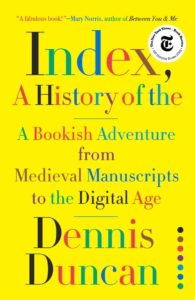A selection of recommended books about indexing which I have found to be incredibly helpful over my indexing career and links to several indexing societies around the globe.
All of the indexing book reviews are based on ones I posted to my now-defunct book blog over the years. I am collecting them here in an abbreviated form instead.
Indexing Societies and Associations:
- Indexing Society of Canada
Indexers.ca - American Society for Indexing
asindexing.org - Society of Indexers
indexers.org.uk
Recommended books on indexing:
All of these books are ones I have copies of (sometimes more than one) on my shelves.
 Indexing Books, Second Edition
Indexing Books, Second Edition
Nancy C. Mulvany
Copyright: 2005
Originally I found out about Indexing Books as it was one of the textbooks for the Berkley Indexing and Abstracting course I took as part of my indexer training.
If I had to recommend one book for someone who had to create their own index, this would be the book. It covers the process of creating an index, editing it and formatting it to specifications. Readable and clear, as well as detailed. I’m still referring back to Mulvaney’s book on a regular basis as I work, especially when it comes to tricky issues such as names and titles.
 Indexing Tactics and Tidbits
Indexing Tactics and Tidbits
Janet Perlman
Copyright: March 2016
Another reference work suited both to those contemplating becoming an indexer, and to more experienced indexers. Janet Perlman has written a book that’s both entertaining and informative, covering subjects as far-ranging as the indexing process, office space/set-up, computing needs, and the business side of freelance indexing.
Each separate section of the book also includes a solid “Notes” section gathering together references to other indexing books and articles for further information on the topic.
I actively enjoy reading reference works on indexing and this is one of my favorites, with only one complaint: it’s too short – and yet, I can’t think of anything the author missed.
 Indexing Names
Indexing Names
Ed. Noeline Bridge
Copyright: April 2012
You’d think that names would be one of the simplest parts of the indexing process. I’d say the opposite is true. In fact, name-related questions seem to be some of the most common I see on the various indexing mailing lists.
Depending on the books I’m indexing, this book frequently spends more time on my desk than my shelf. A glance at the table of contents will clearly demonstrate why:
- The Seven Problem Approach to Indexing Names by Noeline Bridge
- Classical and Medieval Names by Kate Mertes
- Arabic Names by Heather Hedden
- Dutch Names by Jacqueline Pitchford
- French Names by Noeline Bridge
- German Names by Jacqueline Pitchford
- Spanish and Portuguese Names by Francine Cronshaw
- Chinese Place Names by Liquan Dai
- Hawaiian Names by Ruth Horie
- Hmong Names by Madeline Davis
- Indonesian Names by Madeline Davis and Noeline Bridge
- Te Reo Maori Names by Elaine N. Hall
- Thai Names by Sue Lightfoot
- Names in Biographies by Martin L. White
- Religious Names by Kate Mertes
- Titles of Royalty and Nobility in the United Kingdom by Auriol Griffith-Jones
- Names in Art Books by Enid L. Zafran
- Names in the Performing Arts by Linda Dunn
- Name Problems: Dispelling the Simplicity Myth by Sherry L. Smith
- The Hurdles of Automated Name Indexing by Seth A. Maislin
- Names in Fiction by Enid L. Zafran
- Corporate Names by Noeline Bridge
- Geographic Names by Noeline Bridge
- Using the Library of Congress Authority File by Janet Russell
- Resources for Personal Names by Noeline Bridge
I’ll just put it this way: Indexing Names is the only indexing book to date where I’ve bought two separate copies: one paper, and one e-book version because I use it that frequently.
 Facing the Text: Content and Structure in Book Indexing
Facing the Text: Content and Structure in Book Indexing
Do Mi Stauber
Copyright: 2004
I’d say that of the books on indexing that I own, this is the one I’ve read cover-to-cover the most often. It is also the most challenging one to get through I’ve found.
Facing the Text also tends to leave me contemplating my indexing process and the decisions I make therein. Not necessarily a book for someone contemplating becoming an indexer, but one I’d recommend for after taking the training and getting started. Still, as I said above, it’s a book that I keep coming back to, and on every read, I notice new details as I’ve gained more experience over the years.
And on the slightly lighter side is the new book on the history of indexes and indexing by Dennis Duncan:

 Index, A History of the: A Bookish Adventure from Medieval Manuscripts to the Digital Age
Index, A History of the: A Bookish Adventure from Medieval Manuscripts to the Digital Age
Dennis Duncan
Copyright: 2021
Every review of this book that I’ve seen has been nothing but positive – both professional reviews in the media, and individual reviews on social media.
This is the Amazon.com book description:
Most of us give little thought to the back of the book―it’s just where you go to look things up. But as Dennis Duncan reveals in this delightful and witty history, hiding in plain sight is an unlikely realm of ambition and obsession, sparring and politicking, pleasure and play. In the pages of the index, we might find Butchers, to be avoided, or Cows that sh-te Fire, or even catch Calvin in his chamber with a Nonne. Here, for the first time, is the secret world of the index: an unsung but extraordinary everyday tool, with an illustrious but little-known past.
Charting its curious path from the monasteries and universities of thirteenth-century Europe to Silicon Valley in the twenty-first, Duncan uncovers how it has saved heretics from the stake, kept politicians from high office, and made us all into the readers we are today. We follow it through German print shops and Enlightenment coffee houses, novelists’ living rooms and university laboratories, encountering emperors and popes, philosophers and prime ministers, poets, librarians and―of course―indexers along the way. Revealing its vast role in our evolving literary and intellectual culture, Duncan shows that, for all our anxieties about the Age of Search, we are all index-rakers at heart―and we have been for eight hundred years.
All of the book covers are links to Amazon.com via my Amazon Associates account.
